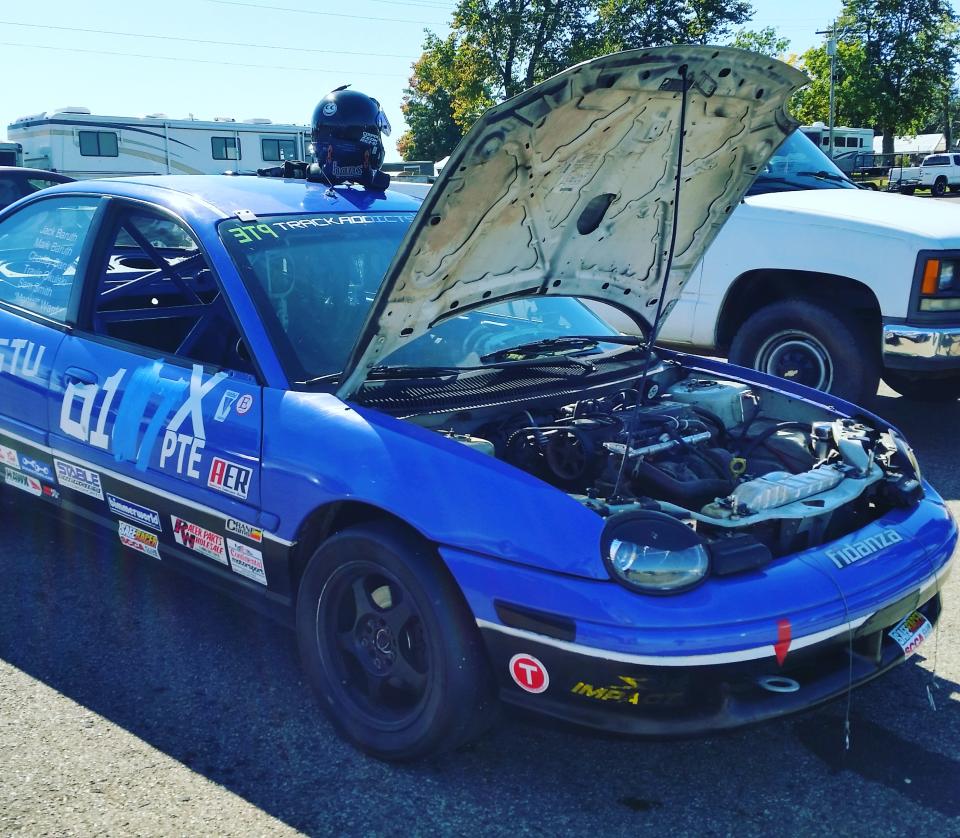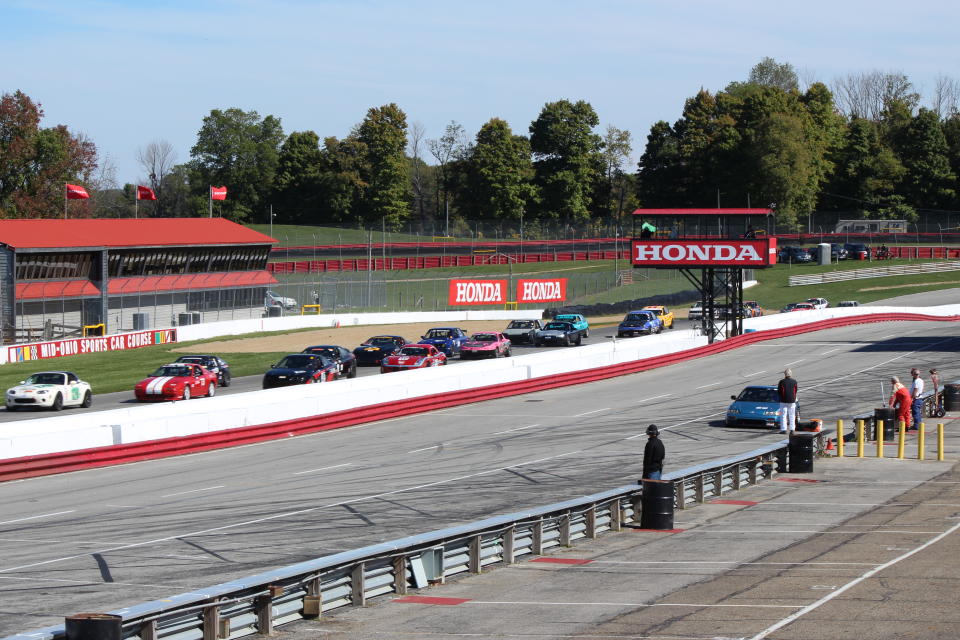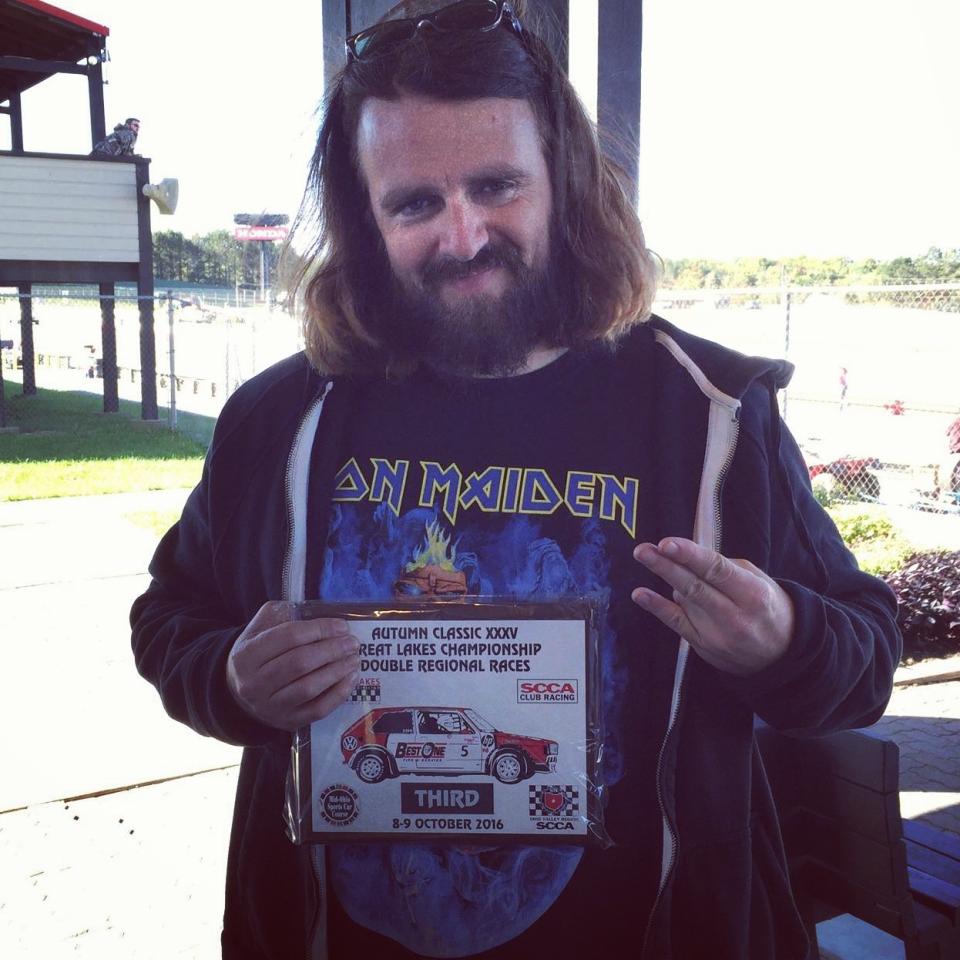Club Racing with the SCCA Is Alive and Well

It was long past sunset on a Friday night when I presented myself and my trusty Plymouth Neon at Mid-Ohio's tech shed. "I need your help," I told the sixty-ish fellow behind the fold-out table. "I'm a rookie with the SCCA and this is my first race."
He took a look at me and the gear I was holding: custom OMP suit with a Grand-Am patch on it, carbon-fiber Impact helmet, first-generation HANS Pro with a re-certification sticker, Fila Schumacher shoes with soles worn nearly through. Then he looked at my car: bristling with tech stickers from other sanctioning bodies, a custom LaJoie seat, tire marks and dents from a dozen contact incidents all the way down both sides.
"You're a rookie," he repeated, very slowly, "and this is your first race. Well, rookie, it's pretty late at night to get you a logbook for your car and do a full safety inspection." Then he paused for a moment. Honestly, this is exactly what I'd always been told about the SCCA, through more than a decade of racing with everybody from LeMons to the Koni Challenge. A bunch of old dudes, enforcing ancient rules and being persnickety about it. I was about to bow politely and offer to return tomorrow morning when he cracked a smile. "But if you have a flashlight," he said, "get it out, and we'll get you that logbook tonight."
You could call me part of the SCCA's "lost generation." Like many other would-be racers, I started my competitive career as a regional SCCA autocrosser, going from there to the National Tour and eventually to the Solo National Championships. The next step on the ladder was to attend an SCCA racing school and start my club race career. But I'd heard a lot of negative things about the road-race side of the club over the course of half a decade's autocrossing and open trackdays.
My friends told me that the SCCA was a bunch of old guys racing old cars. That they didn't want anybody new. That you couldn't even bring your family or friends to watch you race without paying a spectator fee. That the rulebook didn't have room for the kinds of cars that we wanted to race-Miatas, compact sedans, pumped-up 300-horsepower Honda hatches. And truth be told there didn't seem to be a lot of crossover between the autocrossers and the road racers in my region. So I didn't know anybody who could have contradicted those stories.
When my friends got their competition licenses and started racing, they started with NASA. So did I, and I continued to race with the sanction off and on for a full decade. I think I would have been content to race with NASA for the rest of my life, honestly. But when I got into an argument with my NASA series director about some rulings that seemed designed to get him and his friends free tires on Hoosier's contingency program-and when I saw that same fellow selling lightly-used Hoosiers on eBay-I decided I'd take the rest of the year off and try something different.

My wife, the infamous Danger Girl, had just gotten her SCCA competition license through Skip Barber. So I sent my resume to the SCCA and asked for a license. I was prepared for all sorts of drama-hadn't I been told that the club loved its bureaucracy?-but there was none of that. I submitted a medical form and got my license a week later. Then I entered a "double regional" at Mid-Ohio and dragged my Performance-Touring-spec Neon to the track for classing.
The Frankenstein engine in my Neon, stroked out to 2.4 liters, caused me no end of hassle with my local NASA region. But the SCCA didn't care. They had a class for me-Super Touring "U"-and my Neon met their rules. NASA uses dyno sheets to class cars, but the old guys in the SCCA are wayyyyy too smart to believe in somebody's dyno sheet, particularly not in the age of stand-alone engine management. They give you a minimum weight based on engine size, and they assume that you're doing everything humanly possible to make the maximum power from that engine.
Which I wasn't-my engine is basically making the same power it made in a Voyager minivan sixteen years ago. So I didn't figure I'd be competitive. Luckily for me, however, there were seven other cars in the class, and they ranged from the highly committed (an ex-Grand-Am SRT-4) to the casually participating (a beat-up looking Sentra SE-R). I figured I'd get a race against somebody.
I qualified 4th Saturday morning; the track was pretty cold but I know Mid-Ohio awfully well and I found some grip that must have eluded everybody else. Our class ran as part of a forty-car field, and I started 17th overall. I didn't pass any of my fellow STU racers, but I held the guys behind me off. When the leader retired, I was set for a podium-and when the BMW I was catching spun out, I was thrilled at the idea of taking second place, behind the SRT-4, in my SCCA debut.

Unfortunately, my Neon had other plans. The radiator cap failed with just two laps left to go. I pulled off to save the engine. That meant that I'd be starting the next morning's qualifying race in 35th place. But I didn't really care. I was having too much fun talking to my competitors, who were by and large utterly fascinating and cheerful people. I was reminded over the course of a dozen conversations that the SCCA is a club, not a for-profit operation. Everybody has a vote, everybody is supposed to be friendly.
The qualifying race started awfully badly; the car ahead of me wouldn't drive up to the back of the pack before the green flag flew. He was a rookie himself, you see, and he didn't know that we were supposed to bunch up before the flag. But I made it from 35th to 15th during the 20-minute race, passing a couple of the slower STU cars on the way to finish fourth in our group.
When the green flag flew for Sunday's afternoon race, I was so excited I could hardly stand myself. This was what I'd dreamed of as a kid-taking my rookie SCCA start with a trophy on the line. Sure, it hadn't exactly turned out the way I thought it would. To begin with, I was 44 years old, instead of eighteen, and I was racing my old Plymouth Neon, not a Stohr sports racer, but who cares? I was here, and I was ready to race.
When the flag flew, I threw caution to the wind and went three-wide with two Civics into Turn One, jumping up to eighth overall and third in class by the Keyhole. I wasn't quite as fast as the BMW behind me, but I was able to use my old bag of sprint-racing tricks to keep him in my mirrors. Two laps later, there was a pretty big wreck, putting us under double-yellow for the rest of the twenty-five-minute race. And just like that, I had my first-ever SCCA podium, in my rookie weekend.

Of course, I acted like a total idiot afterwards. I walked around and thanked everybody, from my fellow racers to the guys in the tech shed. I took a lot of photos for social media. I started brainstorming with my crew chief, Jon Shevel of Albany Autoworks, about how we could get SRT-4-style power out of my minivan motor. And I made sure to get my trophy (actually a plaque) before leaving.
On the way out, I found myself talking with one of the fresher-faced drivers in my race group, a fellow in an ITA-classed Honda. During the course of the conversation, he said something that referred to my presumed status as an "old hand" with the SCCA. Just like that, I realized that I was actually one of the more, ahem, venerable people in my class. At the age of forty-four. So much for the club being nothing but a retirement home for racers, right? Not that I'm young, mind you. But I'd like to think that I have a few decades' worth of green flags left in me.
I might return to NASA next year. I'm not the kind of person to hold a grudge, and I really do like a lot of the people in my region. But it will be secondary to my plans with the SCCA. I have a decade's worth of catching up to do, and I don't want to wait another moment to do it. I might even volunteer, you know. That's part of being a member. I'm thinking I'm going to learn how to work at the tech shed. There's probably somebody reading this right now, maybe a high-schooler or younger, who will find himself or herself dragging some old car up some Friday night twenty years from now to get a logbook. I might be the old guy you see waiting for you, chatting with my friends, telling bench-racing stories. It's okay if you show up a little late. I'll still help you out. Bring a flashlight.
Born in Brooklyn but banished to Ohio, Jack Baruth has won races on four different kinds of bicycles and in seven different kinds of cars. Everything he writes should probably come with a trigger warning. His column, Avoidable Contact, runs twice a week.
You Might Also Like

 Yahoo Autos
Yahoo Autos 